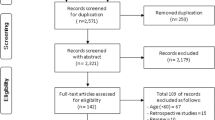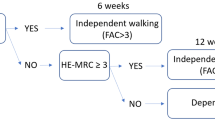Abstract
Purpose
The six-minute walking test (6MWT) is a simple and widely used measure of functional capacity. The aim of this systematic review is to summarize findings on reliability of 6MWT in subjects who have had a stroke.
Methods
Two independent investigators conducted an extensive search in multidisciplinary electronic databases from inception to August 2019, and selected complete original studies on the reliability of the 6MWT used to assess individuals with stroke. Two reviewers independently extracted data and evaluated methodological quality. Outcome for meta-analysis was reliability, measured by intraclass correlation coefficient (ICC). In addition, standard error of measurement (SEM) and minimal detectable change (MDC) were recorded.
Results
Of the 241 potentially relevant articles screened, 6 met inclusion criteria and 5 of them were included in meta-analysis. Combined correlation coefficient of .98 (confidence interval .98–.99) was found for test-retest reliability. Only one study investigated inter-rater and intra-rater reliability. SEM and MDC values were rarely reported.
Conclusions
The 6MWT has high test-retest reliability, when used to assess individuals with stroke. Other types of reliability and SEM and MDC need further investigations in populations with a stroke.



Similar content being viewed by others
References
Kelly JO, Kilbreath SL, Davis GM, Zeman B, Raymond J (2003, 2003) Cardiorespiratory fitness and walking ability in subacute stroke patients. Arch Phys Med Rehabil 84:1780–1785. https://doi.org/10.1016/s0003-9993(03)00376-9
Guyatt GH, Sullivan MJ, Thompson PJ, Fallen EL, Pugsley SO, Taylor DW, Berman LB (1985) The 6-minute walk: a new measure of exercise capacity in patients with chronic heart failure. Can Med Assoc J 132:919–923
Stoller O, de Bruin ED, Knols RH, Hunt KJ (2012) Effects of cardiovascular exercise early after stroke: systematic review and meta-analysis. BMC Neurol 12:45. https://doi.org/10.1186/1471-2377-12-45, https://doi.org/10.1186/1471-2377-12-45
English C, Hillier S (2011) Circuit class therapy for improving mobility after stroke: a systematic review. J Rehabil Med 43:565–571. https://doi.org/10.2340/16501977-0824
Ada L, Dean CM, Vargas J, Ennis S (2010) Mechanically assisted walking with body weight support results in more independent walking than assisted overground walking in non-ambulatory patients early after stroke: a systematic review. J Physiother 56:153–161. https://doi.org/10.1016/S1836-9553(10)70020-5
Outermans J, van de Port I, Wittink H, de Groot J, Kwakkel G (2015) How strongly is aerobic capacity correlated with walking speed and distance after stroke? Systematic review and meta-analysis. Phys Ther 95:835–853. https://doi.org/10.2522/ptj.20140081
Crapo RO, Casaburi R, Coates AL et al (2002) ATS statement: guidelines for the six-minute walk test. Am J Respir Crit Care Med 166:111–117. https://doi.org/10.1164/ajrccm.166.1.at1102
Pollentier B, Irons SL, Benedetto CM, Dibenedetto AM, Loton D, Seyler RD, Tych M, Newton RA (2010) Examination of the six minute walk test to determine functional capacity in people with chronic heart failure: a systematic review. Cardiopulm Phys Ther J 21:13–21
Bellet RN, Adams L, Morris NR (2012) The 6-minute walk test in outpatient cardiac rehabilitation: validity, reliability and responsiveness--a systematic review. Physiotherapy 98:277–286. https://doi.org/10.1016/j.physio.2011.11.003
Bartels B, de Groot JF, Terwee CB (2013) The six-minute walk test in chronic pediatric conditions: a systematic review of measurement properties. Phys Ther 93:529–541. https://doi.org/10.2522/ptj.20120210
Bernard P, Romain AJ, Vancampfort D, Baillot A, Esseul E, Ninot G (2015) Six minutes walk test for individuals with schizophrenia. Disabil Rehabil 37:921–927. https://doi.org/10.3109/09638288.2014.948136
Ng SS, Tsang WW, Cheung TH, Chung JS, To FP, Yu PC (2011) Walkway length, but not turning direction, determines the six-minute walk test distance in individuals with stroke. Arch Phys Med Rehabil 92:806–811. https://doi.org/10.1016/j.apmr.2010.10.033
Dunn A, Marsden DL, Nugent E, Van Vliet P, Spratt NJ, Attia J, Callister R (2015) Protocol variations and six-minute walk test performance in stroke survivors: a systematic review with meta-analysis. Stroke Res Treat 2015:484813–484828. https://doi.org/10.1155/2015/484813
Mokkink LB, de Vet HCW, Prinsen CAC, Patrick DL, Alonso J, Bouter LM, Terwee CB (2018) COSMIN Risk of Bias checklist for systematic reviews of Patient-Reported Outcome Measures. Qual Life Res 27:1171–1179. https://doi.org/10.1007/s11136-017-1765-4
Field AP (2005) Is the meta-analysis of correlation coefficients accurate when population correlations vary? Psychol Methods 10:444–467. https://doi.org/10.1037/1082-989X.10.4.444
Higgins JPT, Thompson SG (2002) Quantifying heterogeneity in a meta-analysis. Stat Med 21:1539–1558. https://doi.org/10.1002/sim.1186
Egger M, Davey Smith G, Schneider M, Minder C (1997) Bias in meta-analysis detected by a simple, graphical test. BMJ 315:629–634. https://doi.org/10.1136/bmj.315.7109.629
Fitzpatrick R, Davey C, Buxton M, Jones D (1998) Evaluating patient based outcome measures for use in clinical trials. Health Technol Assess 2:1–74
Eng JJ, Dawson AS, Chu KS (2004) Submaximal exercise in persons with stroke: test-retest reliability and concurrent validity with maximal oxygen consumption. Arch Phys Med Rehabil 85:113–118. https://doi.org/10.1016/s0003-9993(03)00436-2
Flansbjer UB, Holmbäck AM, Downham D, Patten C, Lexell J (2005) Reliability of gait performance tests in men and women with hemiparesis after stroke. J Rehabil Med 37:75–82. https://doi.org/10.1080/16501970410017215
Kosak M, Smith T (2005) Comparison of the 2-, 6-, and 12-minute walk tests in patients with stroke. J Rehabil Res Dev 42:103–107. https://doi.org/10.1682/jrrd.2003.11.0171
Fulk GD, Echternach JL, Nof L, O'Sullivan S (2008) Clinometric properties of the six-minute walk test in individuals undergoing rehabilitation poststroke. Physiother Theory Pract 24:195–204. https://doi.org/10.1080/09593980701588284
Liu J, Drutz C, Kumar R, McVicar L, Weinberger R, Brooks D, Salbach NM (2008) Use of the six-minute walk test poststroke: is there a practice effect? Arch Phys Med Rehabil 89:1686–1692. https://doi.org/10.1016/j.apmr.2008.02.026
Wevers LE, Kwakkel G, van de Port IG (2011) Is outdoor use of the six-minute walk test with a global positioning system in stroke patients' own neighbourhoods reproducible and valid? J Rehabil Med 43:1027–1031. https://doi.org/10.2340/16501977-0881
Singh SJ, Puhan MA, Andrianopoulos V, Hernandes NA, Mitchell KE, Hill CJ (2014) An official systematic review of the European Respiratory Society/American Thoracic Society: measurement properties of field walking tests in chronic respiratory disease. Eur Respir J 44:1447–1478. https://doi.org/10.1183/09031936.00150414
Roul G, Germain P, Bareiss P (1998) Does the 6-minute walk test predict the prognosis in patients with NYHA class II or III chronic heart failure? Am Heart J 136:449–457. https://doi.org/10.1016/s0002-8703(98)70219-4
Zugck C, Krüger C, Dürr S, Gerber SH, Haunstetter A, Hornig K, Kübler W, Haass M (2000) Is the 6-minute walk test a reliable substitute for peak oxygen uptake in patients with dilated cardiomyopathy? Eur Heart J 21:540–549. https://doi.org/10.1053/euhj.1999.1861
Steffen TM, Hacker TA, Mollinger L (2002) Age- and gender-related test performance in community-dwelling elderly people: Six-Minute Walk Test, Berg Balance Scale, Timed Up & Go Test, and gait speeds. Phys Ther 82:128–137. https://doi.org/10.1093/ptj/82.2.128
Bautmans I, Lambert M, Mets T (2004) The six-minute walk test in community dwelling elderly: influence of health status. BMC Geriatr 4:6. https://doi.org/10.1186/1471-2318-4-6
Cederberg KLJ, Sikes EM, Bartolucci AA, Motl RW (2019) Walking endurance in multiple sclerosis: meta-analysis of six-minute walk test performance. Gait Posture 73:147–153. https://doi.org/10.1016/j.gaitpost.2019.07.125
Author information
Authors and Affiliations
Corresponding author
Ethics declarations
Conflict of interest
No funding was secured for this study. The authors have no financial relationships relevant to this article to disclose. The authors have no conflicts of interest to disclose.
Research involving human participants and/or animals
Not applicable.
Informed consent
Not applicable.
Additional information
Publisher’s note
Springer Nature remains neutral with regard to jurisdictional claims in published maps and institutional affiliations.
Rights and permissions
About this article
Cite this article
Macchiavelli, A., Giffone, A., Ferrarello, F. et al. Reliability of the six-minute walk test in individuals with stroke: systematic review and meta-analysis. Neurol Sci 42, 81–87 (2021). https://doi.org/10.1007/s10072-020-04829-0
Received:
Accepted:
Published:
Issue Date:
DOI: https://doi.org/10.1007/s10072-020-04829-0




